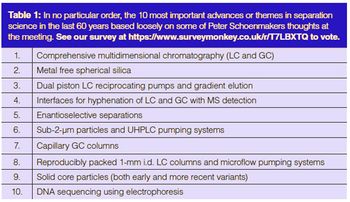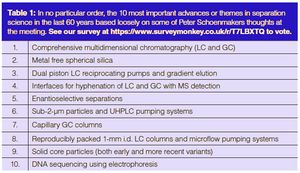
What is the state of separation science in UK and what steps can be taken to promote the importance of the subject?
Paul Ferguson is a principal scientist at AstraZeneca specializing in separation science. He has over 20 years’ experience working in major pharma in early- and late-stage development and first started working with SFC in 2006.

What is the state of separation science in UK and what steps can be taken to promote the importance of the subject?

Small modifications to the way measurements are approached can enable reductions in the waste generated and carbon dioxide produced during an analysis.

Why is SFC becoming increasingly more important as a sustainable analytical technique?

In this extended special feature to celebrate the 35th anniversary edition of LCGC Europe, key opinion leaders from the separation science community explore contemporary trends in separation science and identify possible future developments.

Organized by The Chromatographic Society and the Separation Science Group of the Royal Society of Chemistry’s (RSC) analytical division, the Emerging Separation Technologies meeting was held on the 28 March 2019 at the RSC’s central London headquarters in Burlington House.

The three-day Chromatographic Society meeting was held on Monday 15th until Wednesday 17th May 2017 and was hosted by Pfizer at Discovery Park in Sandwich, Kent, UK. This comprehensive symposium featured oral presentations from leading practitioners of supercritical fluid chromatography (SFC) and ultrahigh-pressure liquid chromatography (UHPLC) from throughout Europe. Some of the latest innovations and applications were described and the lectures were augmented and supported by a comprehensive exhibition of instrumentation and consumables. The attendees gained insight into practical application of these techniques across a variety of industries-particularly the pharmaceutical industry. As was anticipated, in a comprehensive programme there was a significant focus on SFC for chiral and preparative-scale analysis.

In this extended special feature to celebrate the 30th anniversary edition of LCGC Europe, leading figures from the separation science community explore contemporary trends in separation science and identify possible future developments. We asked key opinion leaders in the field to discuss the current state of the art in liquid chromatography instruments.

The three-day Chromatographic Society meeting was held on Monday 15th until Wednesday 17th May 2017 and was hosted by Pfizer at Discovery Park in Sandwich, Kent, UK. This comprehensive symposium featured oral presentations from leading practitioners of supercritical fluid chromatography (SFC) and ultrahigh-pressure liquid chromatography (UHPLC) from across Europe. Some of the latest innovations and applications were described and the lectures were augmented and supported by a comprehensive exhibition of instrumentation and consumables. The attendees gained insight into practical application of these techniques across a variety of industries, particularly the pharmaceutical industry. The comprehensive programme had a significant focus on SFC for chiral and preparative-scale analysis.

The first meeting in The Chromatographic Society’s diamond anniversary year brought together world-renowned speakers alongside past presidents of the Society and delegates from academia, industry, and scientific instrument and technology companies at the Institute of Engineering and Technology in central London. The presentations included discussions on gas chromatography (GC), liquid chromatography (LC), capillary electrochromatography (CEC), and supercritical fluid chromatography (SFC) from both academic and industrial perspectives - providing valuable insight into contemporary trends in chromatographic techniques.

An introduction to The Chromatographic Society’s 60th Anniversary supplement.

The first meeting in The Chromatographic Society’s diamond anniversary year brought together world‑renowned speakers alongside past presidents of the Society, delegates from academia and industry, and scientific instrument and technology companies at the Institute of Engineering and Technology in central London on 22 March 2016. The presentations included discussions on liquid chromatography (LC), supercritical fluid chromatography (SFC), and gas chromatography (GC) from both an academic and industrial perspective - providing excellent insight into the state-of-the-art in these techniques for the delegates.


Published: June 7th 2023 | Updated:

Published: September 8th 2023 | Updated:

Published: October 26th 2015 | Updated:

Published: September 1st 2016 | Updated:

Published: September 1st 2016 | Updated:

Published: October 5th 2016 | Updated: